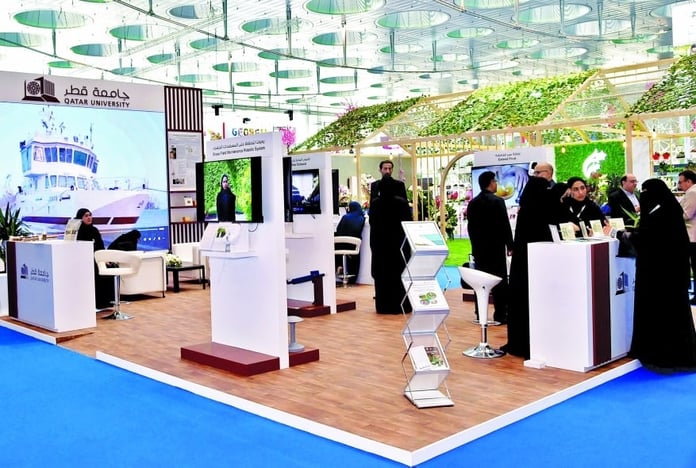Munira Al-Musaifri: 3200 plant samples in the herbarium of Qatar University
Dr. Ahmed Al-Qudah: A Study of the Bio-Genetic Diversity in the Native Plants of Qatar
Establishing a genetic fingerprint and seed bank for local plants for global preservation
6 student projects in the agricultural field to support food security
Qatar University participated with a pavilion in the tenth Qatar International Agricultural and Environmental Exhibition, held at the Doha Exhibition and Convention Center, from March 15 to 19, with the participation of 675 companies from 55 countries. Qatar University aims to highlight its efforts to provide innovations that contribute to food and water security in the State of Qatar. The university’s pavilion at the exhibition included the participation of the Department of Biological and Environmental Sciences, the Agricultural Research Station and the Central Laboratory Unit; affiliated to the research and postgraduate studies sector, in order to present the most important achievements, research and solutions that serve the agricultural research and sustainable development sector.
The Agricultural Research Station presented its most important contributions and projects in order to enhance food security and sustainability. It also showed visitors some models of its products, such as Sidr honey and blue tea, while the Department of Biological and Environmental Sciences gave an explanation and presentation of the Qatar University herbarium, which is the oldest herbarium in Qatar, with 3,200 beds. botanical sample. Ms. Munira Al-Musifri, responsible for the herbarium at Qatar University, said: "There are stages that the sample goes through, starting from the collection from the field to the sample installed in the herbarium laboratory, and there are different stages for collecting the fruits, separating them from the seeds, keeping these seeds in the records of the herbarium, and classifying the vital importance of plants".
For his part, Dr. Ahmed Al-Qudah, Department of Biological and Environmental Sciences, said: "We seek in the Department of Biological and Environmental Sciences to introduce and use biotechnologies and modern technology (biotechnology) in research that serves agriculture in Qatar. We are currently focusing on studying the genetic factors responsible for the genetic biodiversity in the indigenous plants of Qatar and studying how they adapt to the Qatari environment. These studies are very useful in the areas of agricultural sustainability and food security in the State of Qatar. We also seek to establish a seed bank specialized in the indigenous plants of Qatar and develop their genetic fingerprint to preserve and document them globally and use them for the purposes of agricultural sustainability and food security.".
The university also displayed models of student projects in the agricultural and environmental fields, such as a gel material project to support food security, a robot project to preserve green spaces, an artificial coral reef project, a project to develop the future by cultivating algae, a smoke-proof tube project, and a project to extend the life of fruits. In addition to presenting some models of Qatar University partnerships with the Ministry of Municipality, the Agricultural Census Book in Qatar 2021, Agricultural Statistics, and the Book Estimating Costs, Productivity, and Net Return in the Agricultural Sector (Plant-Animal) 2022.
It is worth noting that the Agricultural Research Station of the Research and Graduate Studies Sector at Qatar University works to find and develop innovative agricultural technologies to provide the best ways to use the available natural resources and meet the challenges of dryland cultivation, including advanced irrigation systems, and the application of integrated management of agricultural pests and control of plant diseases. . The station also aims to develop and innovate sustainable organic farming that includes crop rotation, and the application of sustainable organic fertilizer production on farms to increase and preserve agricultural soil fertility.


